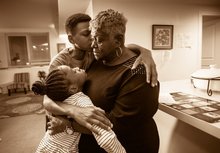0
Case study
Community:
Apr 18, 2024
Households Faced Continued Pressure from High Food Prices and Fewer Supports
Authored by: Poonam Gupta, Elaine Waxman, Michael Karpman, Baris Tezel, and Dulce Gonzalez
Topics: Advocacy, Family engagement, Food insecurity, Health, Healthy homes, Homelessness, Housing
 Shared by Molli Caite Hughes
Shared by Molli Caite Hughes
Molli Caite Hughes posted a
on Apr 23, 2024
Poonam Gupta, Elaine Waxman, Michael Karpman, Baris Tezel, and Dulce Gonzalez
Households Faced Continued Pressure from High Food Prices and Fewer Supports
0
News Article
Community:
Recognizing that the aging of its population will reshape housing needs, the city of Washington, DC, has fostered numerous options for older residents, including some that are intentionally multigenerational.
Authored by: PD&R Edge Online Magazine
Topics: Early childhood, Family engagement, Housing, Low-income, Seniors, Youth
 Shared by Housing Is
Shared by Housing Is
Housing Is posted a
on Jun 11, 2019
PD&R Edge Online Magazine
Recognizing that the aging of its population will reshape housing needs, the city of Washington, DC, has fostered numerous options for older residents, including some that are intentionally multigenerational.
0
News Article
Community:
Apr 4, 2019
Education Design Lab taps four large community colleges in an ambitious effort to raise single-mother completion rate 30 percent at each institution by 2024.
Authored by: Education Design Lab for Ciston PR Newswire
Topics: Dual-generation, Early childhood, Family engagement, Low-income, Metrics, Post-secondary
 Shared by Mica O'Brien
Shared by Mica O'Brien
Mica O'Brien posted a
on Apr 18, 2019
Education Design Lab for Ciston PR Newswire
Education Design Lab taps four large community colleges in an ambitious effort to raise single-mother completion rate 30 percent at each institution by 2024.
0
News Article
Community:
Jan 22, 2019
A D.C. housing development serves as a refuge for grandparents raising young children. Is it a model for the rest of the country?
Authored by: Andrew L. Yarrow for The Washington Post
Topics: Child welfare, Dual-generation, East Coast, Family engagement, Low-income, Place-based, Seniors, Stability, Youth
 Shared by Mica O'Brien
Shared by Mica O'Brien
Mica O'Brien posted a
on Jan 22, 2019
Andrew L. Yarrow for The Washington Post
A D.C. housing development serves as a refuge for grandparents raising young children. Is it a model for the rest of the country?
0
News Article
Community:
Jan 10, 2019
Island School is one of 247 “community schools” in New York. These are regular public schools, with a twist. They have longer days and longer school years: Island stays open 12 hours a day, six days a week, including spring and winter breaks as well as the summer. A psychologist makes weekly rounds. A dentist comes by regularly. So does an optometrist, and students who need glasses get them free.
Authored by: David L. Kirk for The New York Times
Topics: Community development, Dual-generation, East Coast, Education, Family engagement, Homelessness, Housing, Low-income, Mental health, Metrics, Partnerships, Stability, Youth
 Shared by Mica O'Brien
Shared by Mica O'Brien
Mica O'Brien posted a
on Jan 10, 2019
David L. Kirk for The New York Times
Island School is one of 247 “community schools” in New York. These are regular public schools, with a twist. They have longer days and longer school years: Island stays open 12 hours a day, six days a week, including spring and winter breaks as well as the summer.
0
News Article
Community:
Oct 9, 2018
Sweet Water Foundation transformed four blocks in Englewood to cultivate community and help build skills, resources, and opportunities for residents.
Authored by: MacArthur Foundation
Topics: Community development, Family engagement, Food insecurity, Green, Health, Low-income, Midwest, Nutrition, Partnerships, Place-based, Sustainability, Youth
 Shared by Mica O'Brien
Shared by Mica O'Brien
Mica O'Brien posted a
on Oct 24, 2018
Sweet Water Foundation transformed four blocks in Englewood to cultivate community and help build skills, resources, and opportunities for residents.
0
Case study
Community:
Jun 25, 2018
The King County Housing Authority (KCHA), in partnership with the Highline School District and the nonprofit social service organization Neighborhood House, launched the Student and Family Stability Initiative (SFSI) pilot program in 2013 to provide housing and employment supports to homeless and unstably housed families with children enrolled in Highline elementary schools. In 2016, KCHA contracted with the Urban Institute (Urban) to conduct a process and outcome evaluation of the program’s first three pilot years. This evaluation documents how SFSI works, who it serves, and how well it helps participants achieve housing stability. This report synthesizes findings from data collection conducted over approximately 10 months that included document review, interviews with SFSI stakeholders, and analysis of program and other relevant KCHA administrative data.
Authored by: Martha M. Galvez, Amanda Gold, and Sara McTarnaghan
Topics: Attendance, Dual-generation, Education, Family engagement, Housing, Low-income, Pacific Northwest, Partnerships, Place-based, Research, Stability, Workforce development, Youth
 Shared by Mica O'Brien
Shared by Mica O'Brien
Mica O'Brien posted a
on Sep 18, 2018
Martha M. Galvez, Amanda Gold, and Sara McTarnaghan
The King County Housing Authority (KCHA), in partnership with the Highline School District and the nonprofit social service organization Neighborhood House, launched the Student and Family Stability Initiative (SFSI) pilot program in 2013 to provide housing and employment supports to homeless and un
0
Case study
Community:
Jul 12, 2018
The Trauma Informed Community Building (TICB) model is based on BRIDGE Housing Corporation’s experience doing community building work over the past five years in the Potrero Terrace and Annex public housing sites in San Francisco, CA.
Authored by:
Topics: Child welfare, Community development, Dual-generation, Family engagement, Low-income, Mental health, Partnerships, Place-based, Preventative care, Research, Safety
 Shared by Housing Is
Shared by Housing Is
Housing Is posted a
on Jul 12, 2018
The Trauma Informed Community Building (TICB) model is based on BRIDGE Housing Corporation’s experience doing community building work over the past five years in the Potrero Terrace and Annex public housing sites in San Francisco, CA.
0
Case study
Community:
Jul 12, 2018
In Boston, Massachusetts, the Boston Housing Authority, Boston Public Health Commission, the city’s Inspectional Services Department, the Boston Foundation, and local universities and medical institutions have come together over the last decade-plus to address the intersection of health and housing. Motivated by a desire to improve the lives of Boston’s most vulnerable residents, these organizations began collaborating to address asthma and, more recently, to prioritize housing and health needs for pregnant women. By bridging anchor institutions, foundations, and city agencies around health and housing initiatives citywide, Boston has made strides toward providing healthier housing options and integrated health management and referral systems. This case study highlights how a variety of key stakeholders within one city can collaborate to address the health and housing needs of its vulnerable residents.
Authored by:
Topics: Asthma, Child welfare, Dual-generation, Early childhood, East Coast, Exercise, Family engagement, Funding, Health, Home visiting, Homelessness, Housing, Low-income, Medicaid / Medicare, Nutrition, Obesity, Partnerships, Pre-natal, Preventative care, Research, Smoke-free
 Shared by Housing Is
Shared by Housing Is
Housing Is posted a
on Jul 12, 2018
In Boston, Massachusetts, the Boston Housing Authority, Boston Public Health Commission, the city’s Inspectional Services Department, the Boston Foundation, and local universities and medical institutions have come together over the last decade-plus to address the intersection of health and housing.
0
News Article
Community:
Jul 5, 2018
Authored by: Brittany Collins for Purpose Built Communities
Topics: Dual-generation, Education, Family engagement, Low-income, Mobility, Post-secondary, Youth
 Shared by Housing Is
Shared by Housing Is
Housing Is posted a
on Jul 11, 2018
Brittany Collins for Purpose Built Communities
0
News Article
Community:
May 25, 2018
Community organizations are improving health equity by tackling the cycle of poverty in urban neighborhoods.
Authored by: Jacqui Cook
Topics: Asthma, Child welfare, Community development, Early childhood, Exercise, Family engagement, Health, Low-income, Medicaid / Medicare, Midwest, Nutrition, Obesity, Out-of-school time, Partnerships, Preventative care, Racial inequalities, Research, Safety, Youth
 Shared by Housing Is
Shared by Housing Is
Housing Is posted a
on Jul 11, 2018
Community organizations are improving health equity by tackling the cycle of poverty in urban neighborhoods.
0
Case study
Community:
Jul 10, 2018
Reducing Pediatric Asthma through Home Improvements and Education
Authored by:
Topics: Asthma, Child welfare, Community development, Cost effectiveness, Data sharing, Early childhood, Education, Family engagement, Health, Healthy homes, Housing, Low-income, Medicaid / Medicare, Metrics, Partnerships, Place-based, Preventative care, Research, Safety
 Shared by Housing Is
Shared by Housing Is
Housing Is posted a
on Jul 10, 2018
Reducing Pediatric Asthma through Home Improvements and Education
0
News Article
Community:
Jul 10, 2018
Authored by: Tina Rosenberg for The New York Times
Topics: Child welfare, Criminal justice, Domestic violence, East Coast, Family engagement, Housing, Legislation & Policy, Low-income, Research, Safety, Supportive housing, Youth
 Shared by Housing Is
Shared by Housing Is
Housing Is posted a
on Jul 10, 2018
Tina Rosenberg for The New York Times
0
News Article
Community:
Jul 5, 2018
"There's no silver bullet" to end chronic absenteeism, but a simple "nudge" letter has shown real success in reducing truancy. It's working in Tacoma, and it's caught the interest of the Seattle Housing Authority, which houses 10 percent of Seattle's public-school students.
Authored by: Neal Morton for The Seattle Times
Topics: Attendance, Dual-generation, East Coast, Education, Family engagement, Low-income, Research, West Coast, Youth
 Shared by Housing Is
Shared by Housing Is
Housing Is posted a
on Jul 9, 2018
Neal Morton for The Seattle Times
"There's no silver bullet" to end chronic absenteeism, but a simple "nudge" letter has shown real success in reducing truancy.
0
News Article
Community:
Feb 5, 2018
Graduation rates in Arkansas have improved for all racial groups under this program
Authored by: Meredith Kolodner for The Hechinger Report
Topics: Cost effectiveness, Dual-generation, Education, Family engagement, Legislation & Policy, Low-income, Post-secondary, Racial inequalities, South, Youth
 Shared by Housing Is
Shared by Housing Is
Housing Is posted a
on Jul 5, 2018
Meredith Kolodner for The Hechinger Report
Graduation rates in Arkansas have improved for all racial groups under this program
0
News Article
Community:
Feb 15, 2018
Authored by: Jon Marcus and Matt Krupnick for The Hechinger Report (originally featured in The Atlantic)
Topics: Community development, Education, Family engagement, Low-income, Midwest, Post-secondary, Research, Workforce development, Youth
 Shared by Housing Is
Shared by Housing Is
Housing Is posted a
on Jul 5, 2018
Jon Marcus and Matt Krupnick for The Hechinger Report (originally featured in The Atlantic)
0
News Article
Community:
Mar 14, 2018
Education leaders reconvened on Tuesday to continue discussing how to help kids by helping their parents. The approach, known as the “Two-Gen” method is based on data showing a child’s trajectory is largely determined by their parents’ stability.
Authored by: Ryan McKinnon for the Herald-Tribune
Topics: Child welfare, Dual-generation, Education, Family engagement, Literacy, Low-income, School-readiness, Workforce development, Youth
 Shared by Housing Is
Shared by Housing Is
Housing Is posted a
on Jul 5, 2018
Ryan McKinnon for the Herald-Tribune
Education leaders reconvened on Tuesday to continue discussing how to help kids by helping their parents. The approach, known as the “Two-Gen” method is based on data showing a child’s trajectory is largely determined by their parents’ stability.
0
News Article
Community:
Jul 2, 2018
Poor children don't struggle in school because of their parents. They struggle because of poverty.
Authored by: Mical Raz for The Washington Post
Topics: Attendance, Child welfare, Dual-generation, Early childhood, Education, Family engagement, Food insecurity, Grade-level proficiency, Housing, Legislation & Policy, Literacy, Low-income, Out-of-school time, Post-secondary, Racial inequalities, Research, School-readiness, Youth
 Shared by Mica O'Brien
Shared by Mica O'Brien
Mica O'Brien posted a
on Jul 3, 2018
Mical Raz for The Washington Post
Poor children don't struggle in school because of their parents. They struggle because of poverty.
0
Case study
Community:
Jul 10, 2017
These case studies provide a framework for implementing
or replicating promising approaches to use two-generation initiatives
specifically with housing authority residents as means to improve
life outcomes. This report features communities in San Antonio, Texas and
Durham, North Carolina to examine the key components of two-generation
initiatives: social capital; early childhood education;
post-secondary education and workforce development; economic
assets; and health and well-being.
Authored by: Abra Lyons-Warren & Amber-Lee Leslie for HOUSING IS, CLPHA
Topics: Child welfare, Dual-generation, Early childhood, Education, Family engagement, Housing, Partnerships, Place-based, South, Workforce development
 Shared by Abra Lyons-Warren
Shared by Abra Lyons-Warren
Abra Lyons-Warren posted a
on Jul 18, 2017
Abra Lyons-Warren & Amber-Lee Leslie for HOUSING IS, CLPHA
These case studies provide a framework for implementing
or replicating promising approaches to use two-generation initiatives
specifically with housing authority residents as means to improve
life outcomes.
0
News Article
Community:
Jan 25, 2017
A reading program designed to help men become better fathers is associated with better parenting skills as well as behavior and learning improvements in kids, a small study suggests.
Authored by: Lisa Rapaport for REUTERS
Topics: Early childhood, East Coast, Education, Family engagement, Literacy, School-readiness
 Shared by Abra Lyons-Warren
Shared by Abra Lyons-Warren
Abra Lyons-Warren posted a
on Feb 6, 2017
Lisa Rapaport for REUTERS
A reading program designed to help men become better fathers is associated with better parenting skills as well as behavior and learning improvements in kids, a small study suggests.
 Shared by Molli Caite Hughes
on Apr 23, 2024
Shared by Molli Caite Hughes
on Apr 23, 2024

 Shared by Housing Is
on Jun 11, 2019
Shared by Housing Is
on Jun 11, 2019







 Shared by Housing Is
on Jul 12, 2018
Shared by Housing Is
on Jul 12, 2018
 Shared by Housing Is
on Jul 12, 2018
Shared by Housing Is
on Jul 12, 2018
 Shared by Housing Is
on Jul 11, 2018
Shared by Housing Is
on Jul 11, 2018
 Shared by Housing Is
on Jul 11, 2018
Shared by Housing Is
on Jul 11, 2018
 Shared by Housing Is
on Jul 10, 2018
Shared by Housing Is
on Jul 10, 2018
 Shared by Housing Is
on Jul 10, 2018
Shared by Housing Is
on Jul 10, 2018
 Shared by Housing Is
on Jul 9, 2018
Shared by Housing Is
on Jul 9, 2018

 Shared by Housing Is
on Jul 5, 2018
Shared by Housing Is
on Jul 5, 2018

 Shared by Housing Is
on Jul 5, 2018
Shared by Housing Is
on Jul 5, 2018
 Shared by Housing Is
on Jul 5, 2018
Shared by Housing Is
on Jul 5, 2018


 Shared by Abra Lyons-Warren
on Jul 18, 2017
Shared by Abra Lyons-Warren
on Jul 18, 2017
 Shared by Abra Lyons-Warren
on Feb 6, 2017
Shared by Abra Lyons-Warren
on Feb 6, 2017






